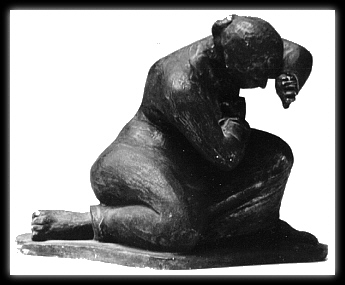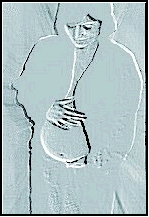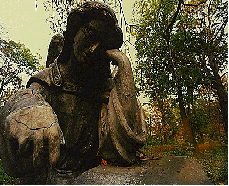Grief,
Loss and Mourning
Carol E. Watkins, M.D.
Glenn Brynes. Ph.D., M.D.
Baltimore, Maryland
|
Must We Grieve? Pregnancy Loss and Stillbirth When An Adolescent Dies Making a Meaningful Memorial for Your Friend How Families Mourn Together Talking To Others About Your Illness Us Search our Site by Key Words and Phrases
|
|
We Grieve? Ph.D., M.D.
When we love someone and they die, it can feel devastating. This seems to be a universal part of our human experience. But why do we have to suffer like this? If we humans lived our lives separately from others, needing and relying on no one but ourselves, then the loss or death of another would have little impact. But we are social creatures. Compared to other animals, we spend a remarkably long period of our lives—18 or more years—living with and depending on our parents. We are born into families. We grow and live surrounded and supported by our social environment. We make friends with, go to school with and work with our neighbors. It is part of our makeup to form strong bonds of caring and affection with other people. The forces that draw us to others are so deeply entwined in our nature. We respond to these forces in powerful and seemingly involuntary ways. We feel these pressures keenly when we are lonely and bereft of companionship; when we feel ashamed and fear social disapproval; and especially when we fall in love and long for the love of another person. At their best, these deeply rooted feelings encourage us to help and protect each other. The resulting bonds bring us help when we need it. It is precisely these feelings that have made our incredibly rich, complex human culture possible. Without it we would be spending our lives trying furtively to gather and hunt enough food to keep ourselves alive from one day to the next. We would have neither the reason nor the ability to pass on what we have learned to others. If we were hurt, we would have only the wisdom of our bodies to heal us. But we are not solitary, and the price we pay for our attachments is vulnerability—the risk of loss. Because we depend on other people—because they do matter to us—they occupy a special place in our hearts. They are like a part of ourselves and cannot be replaced…any more than our hand or some fond memories could be. When someone we love is gone from our lives, it is as if a piece of us has been torn away. The loss rends the fabric of our lives and the wound must be repaired. Grief is that process by which our minds heal this hurt. For us to go on with our lives and again risk caring about others, we need to let go of those we love who are no longer with us. Through this process of mourning, we gradually accept the loss. We allow the dead to be gone from our lives. At the end of mourning, there is still sadness, but it is a wistful sadness that is tempered by the happy memories that we still possess.
of page Empty Womb: Pregnancy Loss E. Watkins, M.D.
Pregnancy is often a time of great hope for the future. The parents decorate a nursery, pick out names and fantasize about future years as their baby grows from childhood into adolescence and adulthood. The start of a new generation may draw in special attention from extended family. The traditions and expectations of relatives add drama and complexity to the process.
More often than one might expect, the dream is shattered. Something goes wrong and the family suffers a miscarriage or a stillbirth. About one in four women miscarry at some stage in their lives. Many people feel that a miscarriage or stillbirth is going to be less distressing than the loss of an older child. After all, no one has gotten to know the unborn child. The miscarriage may mean different things to particular families. To some, the loss feels much greater because they experience the loss of a whole lifetime of memories that will never be. Often the mother feels isolated in her loss. No one else felt the early physical changes, or the first tiny kick. The mother may also feel that her body has somehow let her baby and her family down. Her husband and relatives may not have experienced the baby as a separate person.
In the case of a stillbirth, it often helps the parents to see their baby, hold her, take photographs and give her a name. Even a deformed or premature baby may have features that resemble a parent or relative. If the pictures cause too much pain, they can be stored away and revisited later. Religious rituals associated with birth and death express love, and honor the uniqueness of the lost child.
Relatives should ask the parents how they could help. Unless the parents ask, relatives should not try to smooth things over by disposing of the nursery items. Some parents may experience this as a denial of the reality of the loss.
Friends should not expect the parents to grieve on any given schedule. Pregnancy loss means different things to different couples. For some, the grief continues at an attenuated level for years or even a lifetime.
of page Friend is Still a Kid: Kids Don’t Die! Watkins, M.D.
Your friend, is dead. The words sound so final, so cold. Maybe it was your classmate, boyfriend or confidant. Maybe he died from cancer, a car accident, or by his own hand. Somehow you can’t bring yourself to believe it. He wasn’t even 18. Aren’t your parents and grandparents supposed to die first? If you lose a young friend, you may feel a mixture of emotions that will come as a surprise to you. Some feelings and thoughts are fleeting, and some may stay with you for a lifetime. Everyone experiences grief differently, but many pass through several stages of grief. These are denial, anger, bargaining, depression and acceptance. Some people cycle through some of these stages several times as different experiences or phases of life remind them of the loss. Some who are experiencing denial or anger may want to rid themselves of possessions that remind them of the lost friend. If you can’t stand to look at certain objects, put them away for safe-keeping and wait a few weeks or months before deciding what to do with them. These mementos may be a source of comfort later. Talk to friends. Share funny and happy stories about your friend’s life. This helps make the loss more real and helps make sense of the death by celebrating the life. If you have questions about how the death occurred, ask the friend’s family or the school counselor. You may feel plagued by feelings of responsibility or “What ifs?” Tell yourself that you are not responsible for your friend’s death. Cry and shout if you need to do so. Some find comfort in action. Join with others to create a memorial or to raise awareness about the illness that led to your friend’s death. Take care of yourself. Some adolescents become depressed and even suicidal themselves after the death of a friend. Talk, write or compose music. Keep active. If you feel that you are losing control, seek adult guidance.
of page a Meaningful Memorial for a Friend E. Watkins, M.D.
Often it is difficult to make sense of the death of a child or adolescent. One of the ways to deal with grief is to take action. By doing so, you can celebrate and memorialize the life of the friend you have lost.
There are many kinds of memorials. Every culture, from ancient to modern, has developed unique ways for the living to pay tribute to the dead. Some believe that these rituals give special benefits to the deceased, but others see the funeral and memorial arrangements as powerful source of comfort and support for the living. The most common in our culture is the grave marker, which provides a specific place for family and friends to visit. But there are many other types of memorials that you can create yourself. These may be based on your interests and talents or your relationship to your dead friend.
You and your friends may organize your own meaningful memorial service with different individuals providing anecdotes, and simply a place to weep and laugh together. Photographs, videotape, or sports items may serve as reminders of your friend’s life.
If you are artistically or musically talented, you might compose music or a painting to express your grief, anger or love. A particular painting or musical arrangement may evolve and change as you move through your grief. If you write, you may embark on a series of stories or poems.
Your school or place of worship may allow you to build a memorial garden. Working in the earth can be therapeutic, and planting can express hope in the future. If you do build a garden, be sure that someone makes a commitment to maintain it. Weeds and neglect do not make a good memorial.
Anger is a form of energy. Can you transform this energy into something strong and positive? You might organize a group to promote awareness of the condition that caused the friend’s death. If he died as a result of drunk driving, you might promote SADD (Students Against Drunk Driving.) You might organize discrete rides home for classmates who become intoxicated at parties.
Celebrating and commemorating a friend’s life may not mean that you agree with the way he died. Seeking to understand someone’s reasons for drunk driving or suicide is not the same as condoning a self-destructive act.
Finally, your own life can be a memorial. You bear within you the rich, bittersweet lessons learned from your friend’s short life and death.
of page Families Mourn Together Brynes, Ph.D., M.D.
In order to understand bereavement, we need to make the distinction between grief and mourning. Grief is a person’s internal experience, thoughts and feelings related to the experience of a great loss. Mourning is the external expression of one’s grief. Thus, a person may experience extremely painful grief but, because of a need to appear stoic, may not mourn.
Grief and mourning are intensely personal and unique experiences. We often refer to stages of grief, but these often do not occur in an orderly progression. Depending on the situation and the individuals involved, one may not experience some stages, or may cycle in and out of the same emotional state several times.
A major loss often brings up echoes of past losses. If the family members still have intense unresolved grief, it may complicate the way that they mourn..
Loss often happens in a family context. The family members grieve and mourn individually and as a group. The method of death, sudden or the culmination of a long illness is an important factor. A sudden or violent death may be particularly difficulty for the family to process because of the intense anger often involved. “It didn’t have to happen.” However even if the death is the long expected release from a painful illness, it can still be a powerful experience.
If a parent dies, the children may experience a double loss. One parent has died and the other is too overwhelmed to provide much nurturance. At this time, extended family and the community can step in to support the grieving family.
Marriages may be strained and even fall apart under the strain of death and mourning. Spouses may grieve differently and may resent the way that the partner behaves. Each may be too overwhelmed to reach out to the other.
Those in non-traditional family structures may face additional complexities in their process of mourning. They may be denied legal protection afforded to other families. Church and extended family may not recognize their grief.
Mourning, though a painful process can also be a way for families to grow together. Petty conflicts seem less important in the face of loss. Relationships seem more precious because they are fragile and impermanent. Family members may learn to support each other and truly listen.
of page To Others About Your Illness E. Watkins, M.D. When you first hear the news that you have a serious illness, the first reaction is often to shut it out of awareness. Denial is not all bad. In limited amounts, it may serve a protective function. However, you must eventually take a careful look at the situation. At such a time, it may become helpful and even necessary to talk to friends and loved ones about your illness and your life plans. Many of us are not used to sharing deeply personal feelings with others. Our society has tended to avoid open discussion of illness and dying. Should you share your concerns with others? If you express your fears, will it make them come true? Will your talk of illness and medical procedures burden your friends and relatives? Will they become embarrassed if you start to cry? Many people are loath to reveal their true wants and needs. However, you may discover that others may be wondering what you want. They are often happy to get a clear message from you. They may be at a loss as to what to say to you. If you bring up the subject of your illness, it breaks the ice and may eliminate an awkward barrier. You may start to cry. This is not necessarily bad. It may actually make it easier for both of you to express your intense emotions. Discussing your illness or impending death with someone else may lead to a new and special sense of closeness. Crises can strip away artificial barriers and help us focus on what we really value in each other. When you confront a serious health crisis, you need support. Friends and relatives can provide that. Some of your thoughts and feelings may seem grotesque or morbid. If your friend is able to hear your concerns, he or she may reassure you that these concerns are normal. You may have to make significant life decisions. Discussing these decisions aloud with a confidant may help you clarify what you truly want to do. When you talk to someone about your illness, be open about any strong feelings you experience or that you feel your friend is showing. This ultimately eases any sense of awkwardness. You do not always have to use words to express your thoughts or feelings. Silence, hugs, or holding hands may express a great deal. Tell the other person what he or she has meant to you. Be open about any regrets for past actions or omissions. Every moment in a person’s life carries the potential for growth and a new sense of meaning. You always hope for a reprieve or even a cure, but whether or not it comes, you can still experience growth personally and in closeness to others. top of page County Psychiatric Associates in Monkton and Lutherville, Maryland |
Associates
Our practice has experience in the treatment of Attention
Deficit disorder
(ADD or ADHD), Depression, Separation Anxiety Disorder, Obsessive-Compulsive
Disorder, and other
psychiatric conditions. We are located in Northern Baltimore County and serve the
Baltimore County, Carroll County and Harford County areas in Maryland. Since we are near
the Pennsylvania border, we also serve the York County area. Our
services include psychotherapy, psychiatric evaluations, medication management, and
family therapy. We treat children, adults, and the elderly.
Northern County Psychiatric Associates
Niacin Pills to Pass a Drug Test
Lutherville and Monkton
Baltimore County, Maryland
Phone: 410-329-2028
Web Site http://www.ncpamd.com
Copyright 2001
Carol
E. Watkins, M.D.
Glenn Brynes, Ph.D., M.D.





